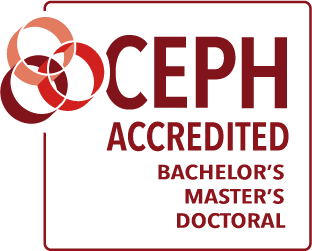Online MS in Health Security Overview
As health threats emerge, will you take the lead? From pandemics and bioterrorism to extreme weather-related crises and public health emergencies, today’s disasters are both complex and broad in scope. Protecting vulnerable populations requires an interdisciplinary understanding of environmental health and exposure sciences, leadership, and public health policy.
Offered online and on campus, the Tulane University Master of Science (MS) in Health Security prepares professionals to bridge these key areas to fortify communities faced with epidemics and pandemics, natural disasters, and human-made emergencies.
The MS in Health Security is the first of its kind in the nation to focus explicitly on health security, placing graduates on the leading edge of crisis response, public health innovation, and global resilience. Are you ready to take on emerging health threats?
Accreditation

Tulane University Celia Scott Weatherhead School of Public Health and Tropical Medicine has been accredited since 1947, and all current programs are accredited by the Council on Education for Public Health (CEPH).
Online MS in Health Security Program at a Glance
Real-World Learning
Gain hands-on experience through partnerships with Emergency Operations Centers (EOCs), hospitals, state health departments, local health agencies, and NGOs.
Policy Impact Focus
Complete an applied master’s thesis that addresses real, high-impact health security challenges in collaboration with government, nonprofit, or private sector partners.
Leadership Development
Train to respond swiftly and strategically to health threats using data-driven decision-making, emergency risk communication, and systems thinking.
Powered by Experts
Learn alongside experts through the CDC-funded Region 6 Center for Health Security & Response Readiness and the Region 6 Public Health Training Center.
Promote Health Security Everywhere
The MS in Health Security is a strong fit for those with experience in health care, emergency management, risk communications, environmental health, biostatistics, and policy who want to augment their existing skills in promoting and protecting population health. Combining strategies and principles from science, leadership, and public health policy, the program prepares students to become community-focused leaders in the face of disaster.
MS in Health Security Program Benefits
Expert Leadership
Built on Tulane’s legacy of public health leadership in the Gulf South’s complex disaster landscape, the program offers a rich, case-based learning experience.
Immersive Education
Gain valuable experience through hands-on fieldwork at EOCs, applied simulations, and a real-world thesis with external agencies.
Powerful Network
Join a powerful alumni network of Tulane WSPH grads who are passionate about collaborating toward improved public health outcomes.
Positive Career Outcomes
An unprecedented 99.7 percent of Tulane WSPH graduates are working, volunteering, or continuing their education within one year of graduation.
What You Will Learn
The MS in Health Security is a 45-credit degree program that can be completed in 24 months. Through hands-on, applied learning, you’ll take courses in critical crisis intervention areas such as:
Leadership
Develop critical leadership and decision-making skills for managing teams, resources, and crises in high-pressure public health environments.
Fundamentals of Environmental Health Sciences
Explore how chemical, physical, and biological environmental factors impact human health and inform health security strategies.
Exposure Assessment
Learn to identify, measure, and assess human exposure to hazardous agents in the environment, both during emergencies and routine scenarios.
Health Security Threats
Examine a broad spectrum of threats to population health, including pandemics, bioterrorism, climate events, and infrastructure vulnerabilities.
Psychosocial Aspects of Disaster
Analyze the mental health and behavioral impacts of disasters on individuals and communities, prioritizing strategies for resilience and recovery.
Disaster and Emergency Communication
Understand principles and best practices in risk and crisis communication to ensure accurate, timely, and effective messaging before, during, and after emergencies
Outbreak and Disaster Response Readiness
Prepare to plan, implement, and evaluate outbreak control and disaster response efforts.
Project Management for Public Health
Get practical tools and frameworks for managing complex public health initiatives, with a focus on planning, budgeting, and stakeholder coordination.
One Health Approaches to Disease
Discover the interconnectedness of human, animal, and environmental health, with a focus on preventing and managing zoonotic and vector-borne diseases.
Curriculum
The MS in Health Security requires a total of 45 credits that include:
Foundational Course Requirements
9 Credit Hours
- Foundations in Public Health
- Biostatistics for Public Health
- Epidemiology for Public Health
Program Course Requirements
27 Credit Hours
- Leadership
- Fundamentals of Environmental Health Sciences
- Exposure Assessment
- Health Security Threats
- Psychosocial Aspects of Disaster
- Disaster & Emergency Communication
- Outbreak and Disaster Response Readiness
- Project Management for Public Health
- One Health Approaches to Disease
Climate and Health Core Coursework
3 Credit Hours (Choose One)
- Climate Change and Public Health
- Applied Data Science for Climate and Health
Selective Coursework
6 Credit Hours (Choose Two)
- Human and Social Factors
- Environment and Infrastructure
- Environmental Health Microbiology
- Principles of Toxicology
- Outbreak Epidemiology
- Critical Infrastructure Protection
- Public Health and Nutrition in Complex Emergencies
- Introduction to GIS for Public Health
Additional Requirements
- Master’s Thesis Research
- Elective Courses (9 credits)
Apply Your Passion To Practice
The MS in Health Security culminates in a master’s thesis with real-world applications, rather than purely research-based work. The thesis requires students to apply existing research to solve real-world health security problems and influence policy that targets specific issues related to health security.
| Scholarships |
| Looking for scholarship opportunities? If you complete the application by the priority deadline and meet our criteria, you could receive $20,000 or more in merit-based awards. More than half of new students receive some form of merit-based scholarship. |
Health Security Careers
As health crises become more frequent, there’s an increasing demand for professionals with expertise in health security, crisis management, and risk communication. The MS in Health Security equips students with this cross-sector expertise, preparing professionals to lead in an era of escalating health threats.
As an MS in Health Security graduate, you'll be a competitive candidate for leadership roles like:
- Public health preparedness officer at a local or state health agency
- Emergency management or risk management official at a hospital or hospital system
- Infection prevention and control specialist at a hospital
- Environmental health and safety officer at a local or state health agency
- Emergency management official at a local, state, or private sector emergency management agency
- Crisis communications specialist at a state, local, or private sector agency
- Specialist with the federal government, including at agencies like the CDC, DHS Office of Health Security, or in the Weapons of Mass Destruction Directorate branch
Upcoming Webinars
Check back soon for more upcoming events.
Celia Scott Weatherhead School of Public Health and Tropical Medicine
As stewards of the first school of public health in the United States, Tulane University Celia Scott Weatherhead School of Public Health and Tropical Medicine cultivates independent thinkers, innovative leaders, fierce advocates, and accomplished scholars. From the neighborhoods of New Orleans to communities worldwide, we conduct research and collaborate with our partners to ensure that all of humanity has an equitable opportunity to be healthy and pursue optimal well-being.

Frequently Asked Questions
We’re accepting applications now, and most programs start three times a year:
Fall, Spring, and Summer.
| Terms | Priority Deadline | Final Deadline |
| Spring 2025 | October 1 | December 1 |
| Summer 2025 | February 1 | March 15 |
| Fall 2025 | March 1 | July 1 |
Tuition:* $1,770 per credit hour (45 credits total)
Academic Support Fee: $100 per credit hour
Student Activity Fee: $80 per semester
Technology Fee: $175 per semester
Within a year of graduation, 99.7 percent of our Tulane public health graduates find jobs in the field or continue their education.
*These tuition figures are estimates for the 2025-26 academic year. Please contact an advisor to talk through your specific tuition plan.
All students are required to supply their own desktop or laptop computers throughout the program. Additionally, students who do not own a printer may want to consider purchasing one to produce hard copies of course materials.